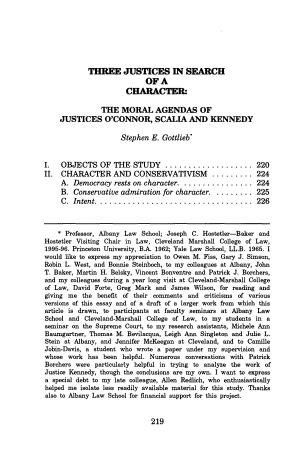Three Justices in Search of a Character: The Moral Agendas of Justices O'Connor, Scalia and Kennedy
January 1996

DISCLAIMER: This text has been transcribed automatically and may contain substantial inaccuracies due to the limitations of automatic transcription technology. This transcript is intended only to make the content of this document more easily discoverable and searchable. If you would like to quote the exact text of this document in any piece of work or research, please view the original using the link above and gather your quote directly from the source. The Sandra Day O'Connor Institute does not warrant, represent, or guarantee in any way that the text below is accurate.
Article Text
(Excerpt, Automatically generated)
THREE JUSTICES IN SEARCH
OF A
CHARACTER:
THE MORAL AGENDAS OF JUSTICES O'CONNOR, SCALIA AND KENNEDY
Stephen E. Gottlieb
OBJECTS OF THE STUDY 220
CHARACTER AND CONSERVATIVISM 224
Democracy rests on character. 224
Conservative admiration for character. 225
Intent. 226
- Professor, Albany Law School; Joseph C. Hostetler-Baker and Hostetler Visiting Chair in Law, Cleveland Marshall College of Law, 1995-96. Princeton University, B.A. 1962; Yale Law School, LL.B. 1965. I would like to express my appreciation to Owen M. Fiss, Gary J. Simson, Robin L. West, and Bonnie Steinboch, to my colleagues at Albany, John
T. Baker, Martin H. Belsky, Vincent Bonventre and Patrick J. Borchers, and my colleagues during a year long visit at Cleveland-Marshall College of Law, David Forte, Greg Mark and James Wilson, for reading and
giving me the benefit of their comments and criticisms of various versions of this essay and of a draft of a larger work from which this article is drawn, to participants at faculty seminars at Albany Law School and Cleveland-Marshall College of Law, to my students in a seminar on the Supreme Court, to my research assistants, Michele Ann Baumgartner, Thomas M. Bevilacqua, Leigh Ann Singleton and Julie L. Stein at Albany, and Jennifer McKeegan at Cleveland, and to Camille Jobin-Davis, a student who wrote a paper under my supervision and whose work has been helpful. Numerous conversations with Patrick Borchers were particularly helpful in trying to analyze the work
